JPC Clears Waqf Bill, Accepts NDA's 14 Amendments and Opposition Raises Concerns
Updated on : 28 January, 2025
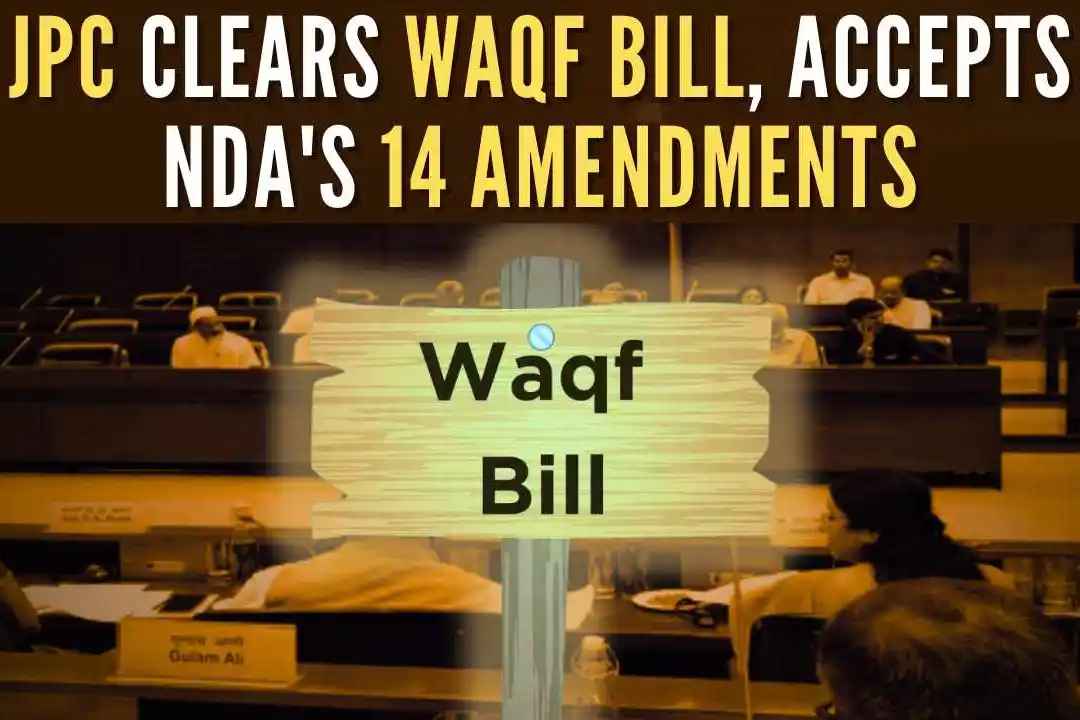
Image Source: Google.com
The ruling BJP and its allied MPs suggested a total of 23 amendments, of which 14 were approved, while all 44 proposals from the Opposition were dismissed following a 10:16 vote. Critics, including Asaduddin Owaisi and Kanimozhi, have raised concerns, arguing that the amendments could violate constitutional rights, particularly those related to religious freedom (Article 15) and minority rights (Article 30). The final report is expected to be submitted by January 31, with voting on the proposed changes scheduled for January 29.
Background of the Waqf Act
The Waqf Act of 1995 regulates the administration of Waqf properties in India, which are assets set aside for religious or charitable purposes in Islam. Over time, several issues have arisen concerning the management, registration, and encroachment of these properties. The recent amendments seek to resolve these challenges while also altering the powers of state waqf boards.
Objectives of the Waqf Amendment Bill
The key objectives of the Waqf Amendment Bill are:
- Revamping Management: To improve the management practices of Waqf properties.
- Enhancing Governance: To give more authority to state governments and improve accountability within waqf boards.
- Promoting Registration: To facilitate the registration of Waqf properties that are currently unregistered.
Timeline of JPC Meetings on the Waqf Amendment Bill
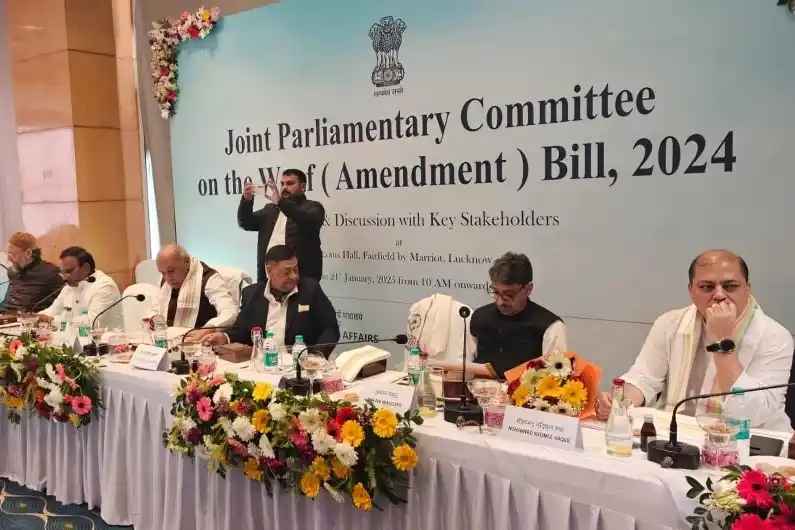
Image Source: Google.com
The Joint Parliamentary Committee (JPC) on the Waqf Amendment Bill conducted several meetings to discuss the proposed amendments and gather stakeholder input. Here is a detailed overview of the key meetings that took place:
| Date | Details |
|---|---|
| August 8, 2024 | The Waqf (Amendment) Bill was referred to the JPC after being introduced in the Lok Sabha by Union Minority Affairs Minister Kiren Rijiju. |
| September 5, 2024 | Initial hearings began, with stakeholders from various organizations providing oral evidence regarding the bill. |
| September 6, 2024 | Further consultations were held with representatives from relevant ministries and organizations. |
| September 19, 2024 | The committee heard views from significant stakeholders, including the All India Muslim Personal Law Board and other community representatives. |
| September 20, 2024 | Additional stakeholder consultations took place, including discussions with the Muslim Rashtriya Manch and Bharat First. |
| October 2024 | Multiple meetings continued throughout the month to review suggestions and amendments proposed by both NDA and opposition members. |
| November 2, 2024 | A significant meeting was held where the committee began discussing amendments in detail. |
| January 27, 2025 | The final meeting took place, where the JPC cleared the Waqf Amendment Bill with 14 amendments proposed by NDA members and rejected all opposition amendments. |
Popular Blogs
Key Amendments Accepted by the JPC
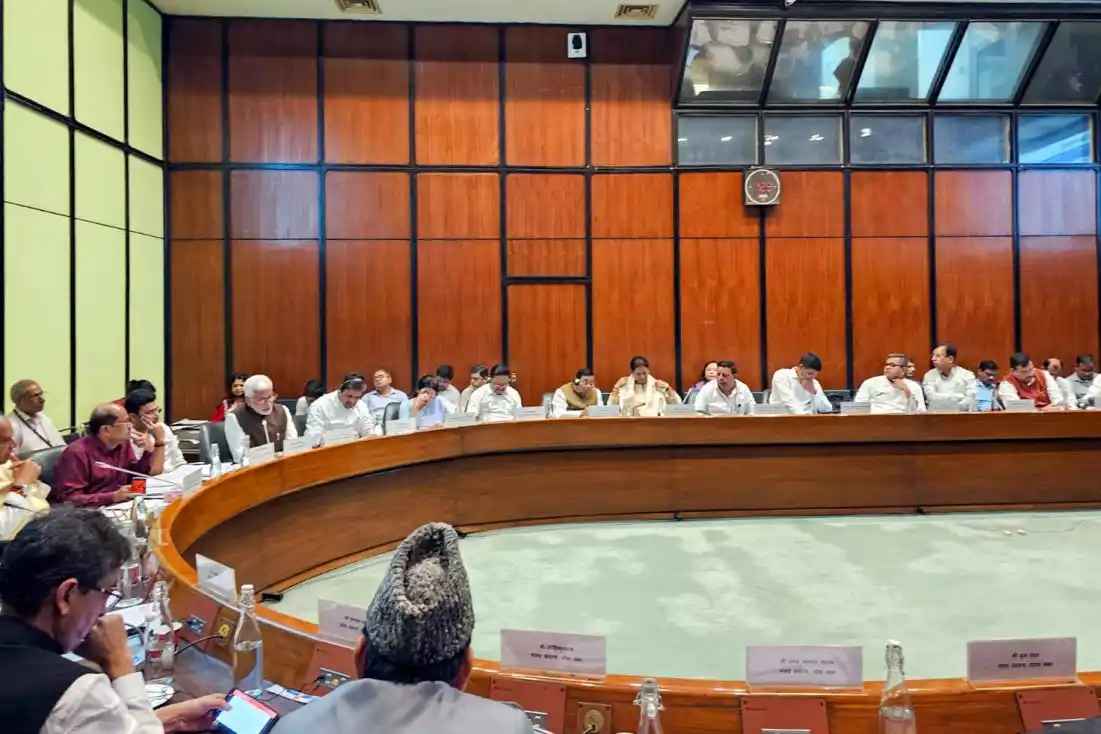
Image Source: Google.com
The JPC's approval of NDA's amendments brings about significant changes that could transform the management of Waqf properties:
-
Authority to Determine Waqf Status: The bill now grants an officer appointed by the state government the authority to decide if a property qualifies as Waqf, replacing the previous power held by the District Collector.
-
Mandatory Inclusion of Non-Muslim Members: The amendments require that Waqf councils at both the state and national levels include at least two non-Muslim members, differentiating them from nominated ex-officio members (who could be either Muslim or non-Muslim), thereby potentially increasing non-Muslim representation.
-
Removal of 'Waqf by User' Clause: The bill removes the clause that prevented challenges to the usage of existing Waqf properties for religious purposes, allowing for more scrutiny of such properties.
-
Non-Retrospective Application: The law will apply only to properties that are registered, sparking concerns raised by Congress leader Imran Masood, as an estimated 90% of Waqf properties remain unregistered.
-
Donation Regulations: Individuals wishing to donate land must show they have been practicing Islam for at least five years and ensure no manipulation is involved in dedicating the property.
-
Enhanced Powers for State Governments: State governments will have greater authority in appointing officials to manage Waqf properties and oversee their usage.
-
Streamlined Survey Processes: The bill introduces more efficient processes for surveying Waqf properties to reduce encroachments and mismanagement.
-
Clarification on Property Usage: The bill will provide clearer guidelines on how Waqf properties can be used, influencing the management of assets within communities.
-
Inclusion of Experts: The amendments propose the inclusion of experts in managing Waqf properties to enhance governance and operational efficiency.
-
Improved Accountability Measures: The changes aim to establish better accountability for Waqf boards, ensuring transparent and effective operations.
-
Provisions for Conflict Resolution: The amendments suggest new mechanisms for dispute resolution related to Waqf properties, providing a structured approach to conflict management.
-
Facilitating Registration of Properties: The bill seeks to simplify the registration process for new Waqf properties, encouraging more assets to be formally recognized.
-
Public Awareness Initiatives: The amendments may include provisions to raise public awareness about Waqf properties and their importance within communities.
-
Regulations on Financial Management: The amendments may introduce enhanced financial regulations to ensure funds are appropriately used for the benefit of the community.
Voting Dynamics
Voting Dynamics
The final vote on the amendments showed a clear divide:
- 14 amendments were accepted from NDA members.
- 44 amendments proposed by opposition members were rejected, with a vote tally of 16 against and 10 in favor.
Chairman Jagdambika Pal emphasized that the process was democratic and represented the majority's will.
NDA’s Stance
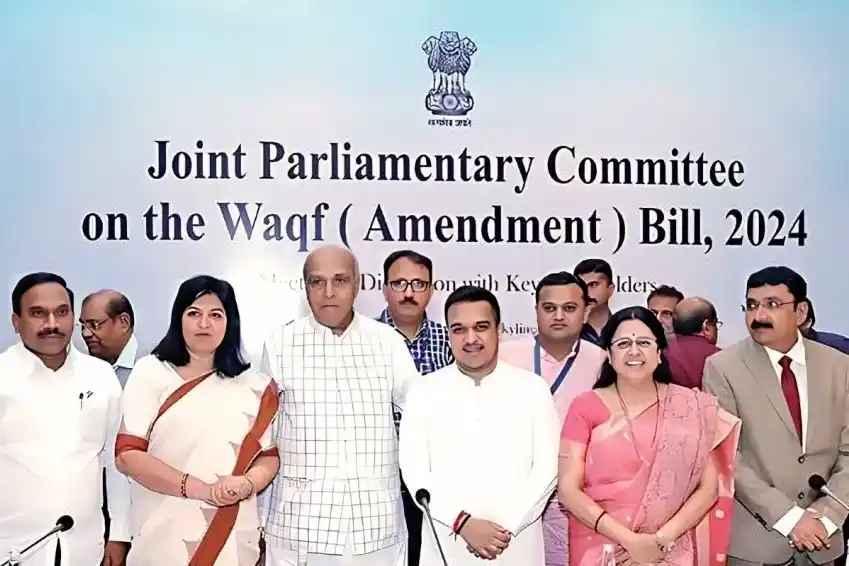
Image Source: Google.com
The NDA, comprising the Bharatiya Janata Party (BJP) and its allies like Janata Dal (United) [JD(U)], Telugu Desam Party (TDP), and Lok Janshakti Party (LJP), has presented a unified position in support of the Waqf Amendment Bill. This alignment is notable, especially since these parties had previously raised concerns over certain provisions in earlier discussions.
Key Points of NDA's Position:
-
Support for Amendments: NDA members proposed 23 amendments to the Waqf Amendment Bill, with 14 of them being accepted by the JPC. This highlights their coordinated effort to modify the bill while maintaining overall backing for its objectives.
-
Revised Composition of Waqf Boards: A key amendment specifies that waqf councils at both the state and national levels must include at least two non-Muslim members. This change aims to improve representation and inclusivity within these councils, although it has faced criticism from opposition parties.
-
Empowerment of State Governments: The bill now empowers state governments to appoint officials who will decide whether a property qualifies as Waqf, replacing the authority previously held by the District Collector. This change is intended to streamline governance and enhance management efficiency.
-
Democratic Process Highlighted: JPC Chairperson Jagdambika Pal emphasized that all amendments were discussed thoroughly over six months, with voting reflecting majority preferences. Pal defended the process against claims of undemocratic practices from the opposition, arguing that decisions were made based on the majority vote—16 in favor and 10 against opposition proposals.
-
Addressing Minority Concerns: The NDA has positioned its support for the bill as a means to empower marginalized communities, including poor and Pasmanda Muslims. BJP MP Aparajita Sarangi stated that the amendments aim to benefit these groups, countering opposition claims that the bill undermines minority rights.
-
Importance of Allied Votes: With the BJP not holding a majority in the Lok Sabha, the votes from NDA allies are essential for the bill's passage. The support from JD(U), TDP, and LJP strengthens the BJP's legislative position.
-
Anticipation of Legislative Success: The NDA is optimistic about the successful passage of the Waqf Amendment Bill in Parliament during the upcoming Budget Session, given their unified stance and prior consultations with allies.
Opposition’s Response
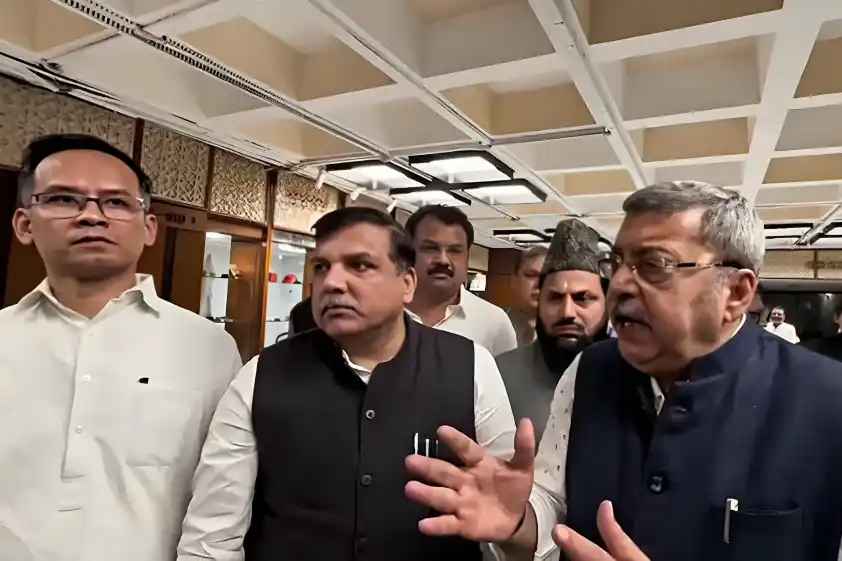
Image Source: Google.com
Opposition members have strongly criticized the JPC's proceedings, asserting that:
- Democratic Process Subverted: Opposition MPs argue they were not given enough time to present their viewpoints or discuss their proposed amendments. TMC MP Kalyan Banerjee referred to the meeting as a "farcical exercise," accusing JPC chairperson Jagdambika Pal of acting in a dictatorial manner.
- Lack of Transparency: There have been allegations about a lack of transparency in the proceedings, with claims that critical documents and minutes of discussions were not shared with opposition members.
- Threat to Minority Rights: Critics contend that the amendments jeopardize minority rights and could result in further marginalization of Muslim communities in India.
In defense, JPC Chairperson Jagdambika Pal maintained that all amendments were discussed and voted on, emphasizing that decisions were made based on majority support—16 votes against opposition amendments versus 10 in favor—arguing that this reflected a democratic process, despite the opposition's objections.
Main Points of Contention Between NDA and Opposition Parties
| Points of Contention | NDA's Position | Opposition's Position |
|---|---|---|
| Democratic Process | Claims the process was democratic, with amendments discussed and voted on. | Argues the process was undemocratic, accusing the chairperson of bias and limited discussion. |
| Inclusion of Non-Muslim Members | Supports including at least two non-Muslim members in waqf councils for broader representation. | Views this as undermining Muslim representation and autonomy in Waqf property management. |
| Authority to Determine Waqf Status | Supports empowering state governments to appoint officials for efficient Waqf status determination. | Fears this centralizes control and undermines community governance, leading to bureaucratic interference. |
| Removal of 'Waqf by User' Clause | Justifies removal to allow scrutiny of how properties are used. | Sees this as a threat to existing rights over properties used for religious purposes. |
| Legal Scrutiny of Existing Properties | Believes changes will streamline property management and reduce encroachments. | Raises concerns about potential legal challenges and disputes, especially since many properties are unregistered. |
| Minority Rights and Representation | Argues the bill aims to empower marginalized communities, including poor Muslims. | Claims the bill threatens minority rights and violates constitutional protections for religious freedom. |
| Voting Dynamics in JPC | Cites majority support (16 votes against opposition's 10) as a mandate for change. | Points out that their proposals were systematically rejected, reflecting a lack of genuine engagement. |
Notable Quotes from Opposition Leaders
The recent discussions around the Waqf (Amendment) Bill have sparked intense political debate in India, especially among opposition leaders who have strongly opposed both the process and the content of the bill. Below are some key quotes from opposition figures that summarize their views on the issue:
Jagadambika Pal - JPC Chairperson
Though not an opposition leader, Pal's comments highlight the differing opinions within the committee. He stated, “It could not have been more democratic than this. If the amendments were moved, and there were 16 members voting against them, and only 10 in favor of them, then can those with 10 members supporting them be accepted?” His words emphasize his confidence in the legitimacy of the JPC's decision-making process despite the opposition's protests.
Kalyan Banerjee - TMC MP
Banerjee called the proceedings “a farcical exercise,” stressing that the actions of the committee did not reflect genuine democratic engagement. He criticized the rejection of opposition amendments as a disregard for minority rights and the integrity of Parliament.
A Raja - DMK MP
Raja expressed his frustration, saying, “The committee's proceedings have been reduced to a mockery. The report is already ready by this time.” This suggests that he feels the outcome was predetermined and that the process lacked transparency.
Mirwaiz Umar Farooq - Cleric from Jammu & Kashmir
Farooq, leading a delegation, voiced concerns over the proposed amendments, stating, “We strongly feel that this process of amending the Waqf bill has created a lot of anxiety among Muslims. It seems like an attempt to disempower a community, which is very unfortunate.” His comments reflect concerns within the Muslim community regarding potential government overreach into religious matters.
Asaduddin Owaisi - AIMIM Leader
Owaisi criticized the bill, calling it an infringement on religious rights and asserting that it undermines constitutional protections for minorities. He said, “This bill is not just about property; it’s about our identity and rights as a community.” His remarks highlight the broader implications of the bill, extending beyond property management to community rights.
Adhir Ranjan Chowdhury - Congress Leader
Chowdhury condemned the actions of the JPC, stating, “The ruling party is trying to impose its will without considering dissenting voices.” He called for a more inclusive approach to legislation that respects all stakeholders involved.
Other Opposition Members
- DMK MP Kanimozhi remarked, “This bill is a direct attack on our secular fabric. We cannot allow such legislation to pass without a fight.”
- Congress MP Shashi Tharoor said, “The rejection of our amendments shows a lack of respect for democratic dialogue. We need to ensure that all voices are heard in Parliament.”
These quotes collectively reflect the strong concerns among opposition leaders regarding the potential impact of the Waqf (Amendment) Bill on minority rights and religious freedoms in India. The ongoing debate mirrors broader tensions in Indian politics around governance, representation, and community rights.
Legal Challenges
The amendments could result in several potential legal disputes:
-
Authority and Jurisdiction: There may be questions regarding the constitutional validity of state-nominated officers’ authority to determine the classification of Waqf properties.
-
Disputes Over Existing Properties: The scrutiny of existing Waqf properties could lead to disputes over ownership and usage rights.
-
Representation Challenges: Changes in the composition of boards could be contested if stakeholders feel the decisions are biased.
-
Minority Rights Violations: Legal challenges could argue that the amendments discriminate against Muslim communities or violate their constitutional rights.
Implications of the Amendments
The acceptance of these amendments brings several important implications for Waqf management:
-
Increased State Control: With state governments being empowered to appoint officers to determine Waqf status, there is potential for greater local influence over property management.
-
Potential for Legal Challenges: The removal of certain protections for existing properties may lead to a rise in litigation concerning property status and usage rights.
-
Impact on Community Trust: Changes in governance structures could undermine community trust in waqf boards, especially if minority representation is perceived to be reduced.
-
Concerns Over Federal Structure: Opposition leaders have expressed concerns that these changes could threaten India's federal structure by centralizing authority over religious property management.
Conclusion
The Waqf Amendment Bill has sparked a heated debate in India, with the NDA supporting the reforms to improve the management and governance of Waqf properties, while the opposition raises concerns about minority rights and religious freedoms. Key points of contention include the inclusion of non-Muslim members in Waqf councils, the empowerment of state governments to determine Waqf status, and the removal of protections for existing properties.
As the bill moves toward a final vote, its potential impact on Indian secularism and community governance is significant. The opposition fears that it could undermine Muslim autonomy and lead to legal challenges. The outcome of this legislation will shape the future of Waqf property management and could influence broader political and social dynamics in India.














